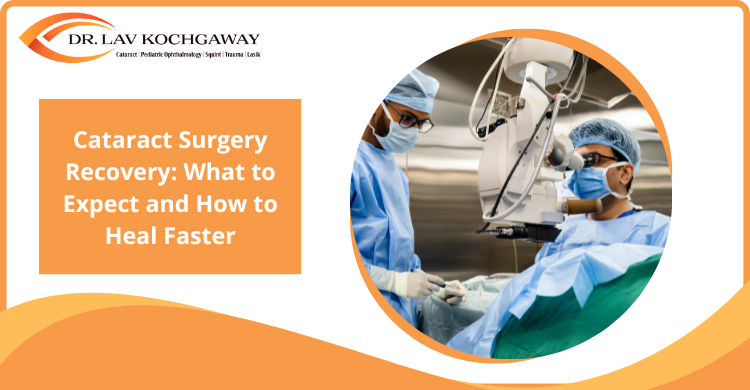
Cataract surgery is one of the most common and successful procedures performed worldwide, offering patients a chance to restore clear vision and improve their quality of life. While the surgery itself is relatively quick and safe, many patients have concerns about the recovery process. Questions such as “How soon will I see clearly?” or “What activities should I avoid?” are common.
Continue reading to get a complete overview of post-cataract surgery care, including timelines and ways to ensure optimal eye health.
A cataract develops when the eye’s natural lens gradually turns cloudy, leading to blurred or dimmed vision. Cataract surgery involves removing this cloudy lens and replacing it with a clear artificial one, called an intraocular lens (IOL).
Two main techniques are used today:
Cataract surgery is typically performed under local anesthesia, and most patients return home the same day. It’s a brief procedure, often taking less than 20 minutes, but the recovery process plays a vital role in achieving the best results.
Right after surgery, you’ll spend some time in a recovery area as your anesthesia wears off. Mild discomfort, blurry vision, or sensitivity to light is normal during the first few hours. The surgeon will provide an eye shield or patch for protection and may start you on prescription eye drops to prevent infection and reduce inflammation.
In most cases:
You’ll need someone to drive you home, and it’s best to rest for the remainder of the day.
The initial week after surgery is crucial for healing. Most patients notice gradual vision improvement within a few days. Blurriness decreases, and daily tasks like reading or using a computer may become easier. However, avoid driving until your doctor confirms that your vision meets legal safety standards.
During this period:
By the end of the first week, most discomfort subsides, and daily routines can be resumed with care.
Mild itching, foreign body sensation, or dryness may persist for a few days. To manage discomfort effectively:
Contact your ophthalmologist immediately if you experience severe pain, sudden vision loss, flashes of light, or an increase in redness or swelling.
A smooth recovery depends on following healthy habits that support healing:
Remember, every patient’s recovery may vary slightly. Consistency with aftercare makes the biggest difference in long-term outcomes.
While most patients experience noticeable improvement in vision within days, full recovery usually takes about 4 to 6 weeks. You’ll likely have multiple follow-up visits during this time to monitor healing and check for complications.
As your eyes stabilize, you may notice marked improvements in clarity, brightness, and color perception. Some patients may need glasses for specific tasks, depending on the type of lens implant used. Maintaining regular eye check-ups ensures your vision stays sharp and healthy.
Healing after cataract surgery is more than just physical, it’s about regaining clarity in everyday life. As your vision gradually improves, small tasks like reading, cooking, or enjoying the outdoors become easier and more enjoyable. With patience, proper care, and attention to your eyes, each day brings a clearer perspective, reminding you that recovery is a step toward renewed independence and brighter experiences.
Regain your vision and confidence with expert care from Dr. Lav Kochgaway. By following the right steps after surgery, you can ease discomfort, heal faster, and watch your world come into sharper focus. Every day of careful recovery brings you closer to reading, driving, and enjoying life fully again.
Book your clarity session today!
Most patients notice clearer vision within a few days, with full recovery in about four to six weeks, depending on healing and care.
No, cataract surgery is virtually painless. You’ll feel mild pressure or discomfort, but numbing drops and quick recovery make it very manageable.
Light activities are fine within a day or two. Avoid heavy lifting, rubbing your eyes, or strenuous tasks until your doctor approves.
Mild itching, light sensitivity, and blurred vision are common early on. These usually improve within a few days as your eyes heal.
Call your doctor immediately if you experience severe pain, sudden vision loss, flashes of light, or persistent redness beyond the first few days.